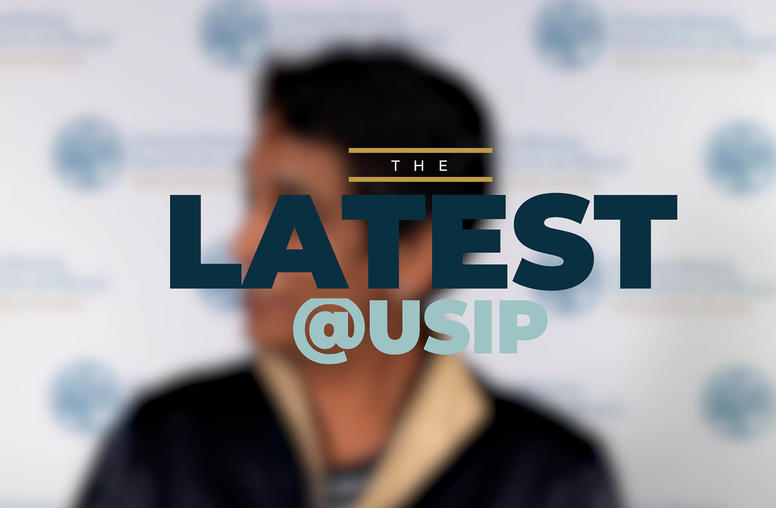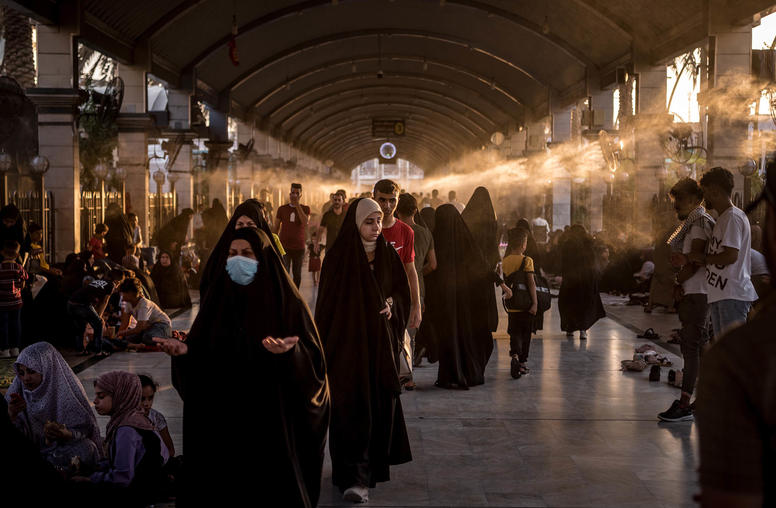Persistent inequalities leave women and girls especially vulnerable to the effects of COVID-19, which continues to devastate communities around the world. In addition to the virus’ first-order health impacts, the pandemic disproportionately threatens their economic participation and physical safety, and policymakers must meaningfully take these factors into consideration for any successful response. In this #COVIDandConflict video, our Danielle Robertson discusses the gender dynamics of the pandemic and how to better incorporate the voices and needs of women and girls into humanitarian efforts.
Transcript
Hi, I'm Danielle Robertson, program officer for Gender Policy and Strategy at USIP, where we've been closely following the effects of the coronavirus pandemic in places and among populations that are especially vulnerable to the impacts of the health crisis.
I recently published an analysis that outlines how efforts to integrate women in peace and security can provide key lessons in crafting inclusive and effective responses to health crises. You can check that out on USIP's website, usip.org.
We received a number of questions about the gender dynamics of COVID-19 and how best to account for the voices of women and girls in our responses to the pandemic. I'll address these in this short video. Ok, our first question: What are some of the gender dynamics that need to be taken into consideration in our response to COVID-19?
What are some of the gender dynamics that need to be taken into consideration in our response to COVID-19?
Well this is a big one. I'll begin with saying that any response to COVID-19 must consider gender dynamics in all of its phases, from tracing exposure to providing treatment to building community recovery. But one place to start is that policy makers must ask themselves how will their efforts impact men and women differently?
One of the greatest failures of this pandemic has been the sharp rise in gender-based violence across the globe. As governments and communities implemented stay-at-home orders or closed non-essential businesses, the issue of domestic violence went unaddressed. From UN Secretary General to local women led organizations, many are referring to this increase in violence against women as a shadow pandemic.
As part of any policy moving forward, gender-based violence must be seen as a public health emergency that impacts everyone. Shelters and domestic violence organizations should be deemed essential services throughout the pandemic and must be funded appropriately. We must ensure that organizations and governments adopt policies that, at the very least, do no harm in the process.
This leads us to a second question we received from the Amani-Institute on Twitter, who asks, "In DRC, the crisis due to COVID-19 seriously threatens the participation of women in economic activities, especially since many women depend on the informal sector to supply families. What can be done to ease their pain in the context of conflicts and humanitarian crises?"
What can be done to ease women's pain in the context of conflicts and humanitarian crises?"
This is an excellent point that brings to light the economic hardships of women, not just in the DRC, but around the world. Women around the world are more likely to lose their jobs than men during the pandemic, and this is because they're more likely to hold part-time or hourly positions or be employed informally.
Alongside unemployment there's also been increases in unpaid labor for women and girls. Normal childcare duties have been compounded with shifts to at-home or suspended schooling, and caring for sick or elderly relatives has become more complicated with fear of infection.
In the short term, economic stimulus plans must extend social safeguards, like unemployment payments and food assistance, and unpaid labor must be directly addressed and accounted for in every stimulus plan.
Long-term though, change is still needed. Families and communities should talk about home and family care responsibilities and think about how everyone can support these efforts, not just the women and girls in the household. Empowering women in the economy, safeguarding their rights in the workplace, and valuing unpaid labor will all build more resilient economies.
Ok, one final question: Moving forward, how can the international community better incorporate the voices and needs of women and girls in their responses to humanitarian crises?
How can the international community better incorporate the voices and needs of women and girls in their responses to humanitarian crises?
This is where we can draw on lessons from the peacebuilding field on the importance of women and girls in decision-making processes. Many have pointed to the fact that women make up 70% of the global healthcare workforce, but only 20% of global health organizations have gender parity on their boards.
Women of diverse backgrounds must be meaningfully included in the strategic planning processes of governments, city councils and humanitarian organizations. This cannot be a "check the box" activity. Not all women are the same. Women of different age, race, ability, nationality and religion all offer important and diverse expertise when responding to crises.
While we are in a period of great upheaval and rapid response, we must also see this as a period of learning. Ask: What are the local women-led efforts that can be replicated or expanded upon? Many informal community structures are often organized and led by women, and many of these groups have responded to the calls for help in their own communities. They are making masks, they're delivering food and they're checking in on their neighbors for their safety and security throughout this crisis.
Learning from and investing in these networks will build resilience at the local level so that the community can more ably adapt in the next crisis.
Thank you for watching, and thank you to all who submitted questions on social media. I encourage you to check out USIP's additional resources on COVID-19 by visiting our website and by following along with the hashtag #COVIDandConflict on social media.



